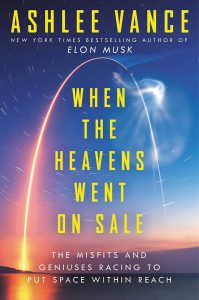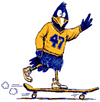 Ashlee Vance ’00, author of the bestseller Elon Musk: Tesla, SpaceX, and the Quest for a Fantastic Future, turns his attention to the business of space in his latest book, When the Heavens Went on Sale: The Misfits and Geniuses Racing to Put Space Within Reach. Vance follows four startup companies—Astra, Firefly, Planet Labs and Rocket Lab—as they race to launch rockets and satellites into orbit. PCM’s Lorraine Wu Harry ’97 spoke to Vance about the book, the corresponding HBO show he is producing and, of course, Elon Musk. The interview has been edited for length and clarity.
Ashlee Vance ’00, author of the bestseller Elon Musk: Tesla, SpaceX, and the Quest for a Fantastic Future, turns his attention to the business of space in his latest book, When the Heavens Went on Sale: The Misfits and Geniuses Racing to Put Space Within Reach. Vance follows four startup companies—Astra, Firefly, Planet Labs and Rocket Lab—as they race to launch rockets and satellites into orbit. PCM’s Lorraine Wu Harry ’97 spoke to Vance about the book, the corresponding HBO show he is producing and, of course, Elon Musk. The interview has been edited for length and clarity.
PCM: What made you want to write this book?
Vance: I was not a space junkie (although I seem to be becoming one). Out of the Elon book, my favorite thing to report on was the early days of SpaceX. Those were some of the best stories and the most interesting characters. Right as I finished that book, I could see that there was this new world bubbling up around commercial space. And there were these entrepreneurs appearing all over the planet who were trying to make rockets and satellites. I could see that this was my chance to witness what may be like the early days of SpaceX firsthand. Then, as time went on, it became clear to me that there was this revolution taking place and that space was changing forever. And I had this unique “in” with all kinds of access that you don’t normally get, and I just started chasing it.
PCM: What was it like for you to do research for this book?
Vance: Normally, almost all this stuff is usually top secret. It’s almost impossible to get into, but because I had this track record, people were very willing to let me in, and then reporting it was just a proper adventure. I probably went to about 12 countries across four continents and followed this for five years. That’s one of the things I love about the book: It is about rockets and space, but it’s also this travelogue where you’re going with me on this journey and meeting all these interesting characters. Some of them are in the U.S., but it’s very much a global story and full of drama in all these places.
PCM: You say in the “Dear Reader” section, “I hope you enjoy reading this as much as I enjoyed living it.” What did you enjoy about living it?
Vance: A lot of these launches take place in pretty exotic locations, and they’re both beautiful but also off the beaten path. The characters were very diverse in their personalities; there are a lot of different archetypes. You got to meet this quite eccentric group of people and spend a lot of time with them. It was this feeling of having a front-row seat to the birth of an industry and really getting to see how it operates. I do lots of very long magazine stories where you might interview dozens of people over a decent period of time. But this was the first time I felt like I was right there getting to witness everything firsthand, and you got a sense of the joy but also the difficulties and travails these people go through. It was the first time in my reporting where I really felt like I knew for sure what ground truth was, through my own eyes, as opposed to trying to stitch it together from other people’s opinions after the fact. I was living it in real time.
PCM: So this was pretty different from all your previous work.
Vance: With Elon, there was a lot of historical stuff where you had to go back all the way to his childhood and recreate things, and the same with some of his earlier companies. But I spent literally thousands of hours with these subjects and so, in that sense, very different in terms of the depth of the reporting. I’d wanted to be a fly on the wall of a journey for a long time.
PCM: Tell me about the show you’re producing and how it overlaps with the book.
Vance: I filmed with all the characters in my book for these five years and I’ve partnered with Steven Spielberg’s Amblin Entertainment and Adam McKay’s Hyperobject Industries on this project. It’s a more concentrated version of the book that is going to focus on a couple of characters from the book and tell the story about the rise of commercial space. As long as the stars align, it will be on HBO next year.
PCM: Your book about Elon Musk came out eight years ago, and a lot has happened since then. What is your assessment of Musk’s ownership of Twitter?
Vance: Since I’ve done the book, Elon’s only gotten bigger, bolder and crazier over time. I’m still a huge fan of Tesla and SpaceX and find them fascinating. Twitter is not really my cup of tea, and I think it’s a huge waste of time for Elon to be dealing with that. He’s not doing probably the best job of taking it over so far. It’s kind of sad, if I’m honest, because so much of my interest in him was this figure who was not doing consumer technology, was doing stuff that felt a bit more meaningful to me in the world of manufacturing and human ambition and climate change. Even though I use Twitter a lot, I find it to be sort of a large distraction and it falls more in the entertainment category to me. It’s a little depressing that this guy who symbolizes so many other things is getting down in the muck.
PCM: How do you think the recent FTX bankruptcy and Twitter meltdown have changed the idea that tech entrepreneurs can supplant traditional government?
Vance: We’re at a very interesting time where there’s a handful of technology companies that have resources on par with governments and are taking on projects that governments traditionally would have done. If you look at Tesla’s self-driving car network, if you look at all the rockets that I’m writing about, if you look at these giant computers fueling AI—outside of China, you don’t really see countries tackling these issues; it’s being driven by the companies. We’re at this precarious position where I think a lot of the innovation and control has shifted so far from governments and academia toward companies. I’m not sure that most people fully realize the extent of this shift to where if you are a college like Pomona or a university like Stanford, and you want to do breakthrough research on the human brain or something like that, you probably do not have the requisite resources to do that yourself. You’re knocking on the door of somebody like Google to borrow their computers. Overall, I’m not sure this is a good thing.
PCM: Why don’t you think it’s good?
Vance: There are pieces of this that are not good. There are pieces of this that are very liberating. I think it’s bad that five countries controlled space for 60 years. I think it’s a much more equitable future where almost any country that wants to be a spacefaring nation can be that. All the satellite imagery, all these pictures taken of Earth are not just in the hands of spy agencies and militaries. That the public can access all this stuff to see the sum total of human activity, what’s happening with the environment, it’s a much more open scenario with information. So I don’t know. There are a lot of pros and cons.
PCM: Would you say the pros outweigh the cons of commercial space?
Vance: I think it’s to be determined. I don’t think the average person on the street realizes what’s coming, which is that 100 percent, the capitalists have taken over space and the governments will very shortly be also-ran participants in this. People get fixated on space tourism or going to the moon, but in actual fact most of the money and action is taking place in low-Earth orbit where there’s this giant economic expansion taking place. This is very much a capitalist exercise that, on the pro side, is going to bring high-speed internet connectivity to half the world’s population so they can fully participate in the modern economy. We’re going to have all this data that was unimaginable about the health of our planet, monitoring trees, methane. You will be able to calculate and tax every piece of this, but it is companies that are doing this. This is new territory that’s being seized.
PCM: So, to be determined.
Vance: Hopefully, given that this is the last place we can expand, with a bit of luck we will be better stewards of it than we have been of the land and the oceans and the air.


